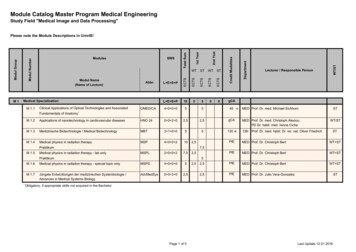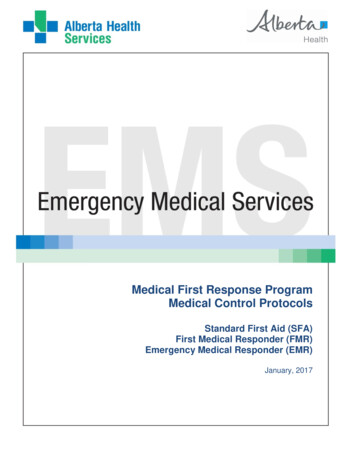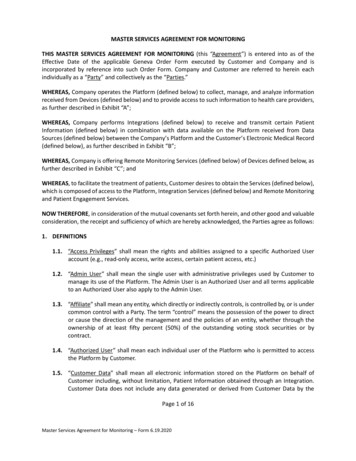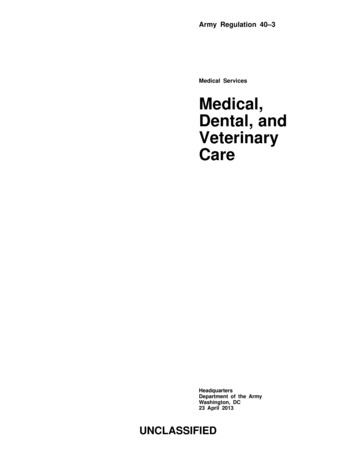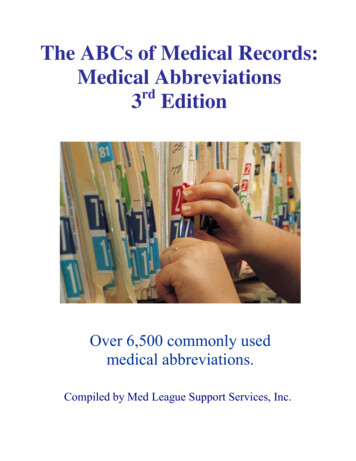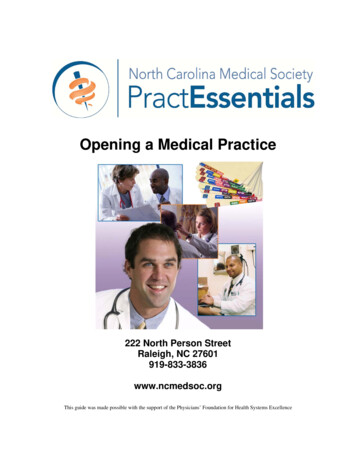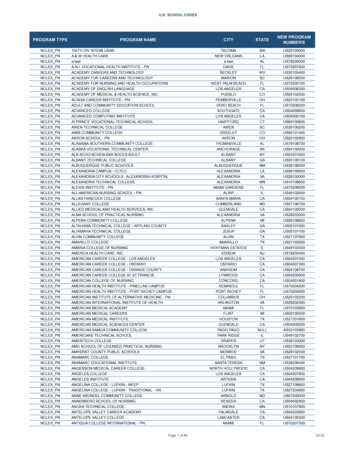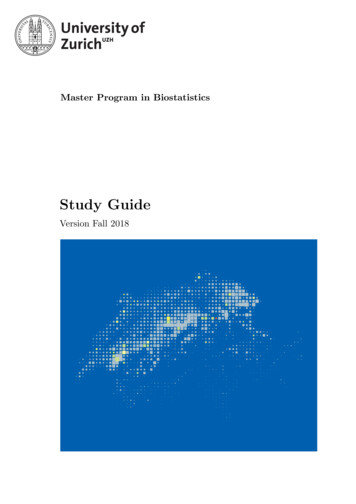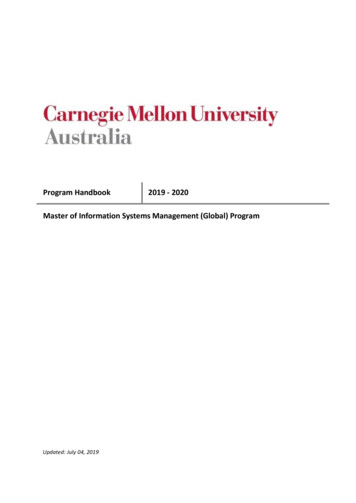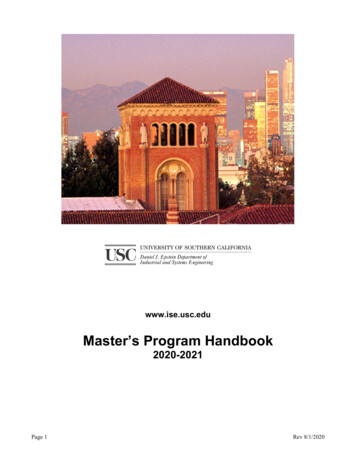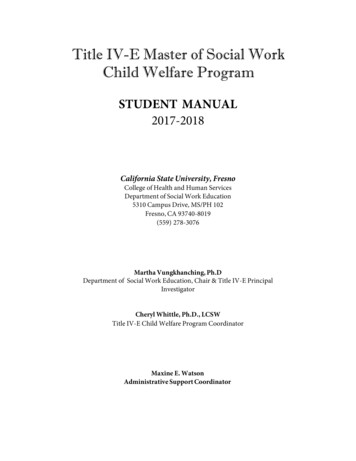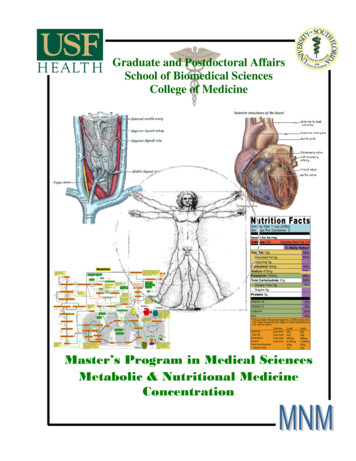
Transcription
Graduate and Postdoctoral AffairsSchool of Biomedical SciencesCollege of MedicineMaster’s Program in Medical SciencesMetabolic & Nutritional MedicineConcentration
Graduate Curriculum: New ConcentrationM.S. in Medical Sciences:Metabolic & Nutritional Medicine ConcentrationConcentration Description: Considered the vanguard of the new millennium in whichscience truly complements the art of medicine, integration of the traditional “basic science” and“clinical science” disciplines that form the foundation of the traditional medical curriculum hasbeen the objective in training clinicians who strive to understand the molecular and physiologicalbases of disease and the aging process with the objective of developing and implementing newapproaches to retard and potentially reverse the aging process in patients using new therapies andpreventative measures such as nutritional intervention and complementary and alternativemedicine (CAM).Recent changes in the focus of research and scholarship in the biomedical sciences has directedattention to the development and training of clinicians in “translational medicine” who are ableto cross the barriers of traditional disciplines and embrace the concepts of interdisciplinaryapproaches to treating the aging process and associated diseases. The new concentration inMetabolic & Nutritional Medicine (MNM), within the Master’s Program in Medical Sciences inthe College of Medicine, has been developed to provide a novel interdisciplinary andconcentrated program of study that is designed for practicing clinicians and other experiencedhealth-care professionals who are committed to developing their theoretical and practicalexpertise in this rapidly evolving field of medical care and who value the interdisciplinaryapproach to the medical sciences.Metabolic Medicine can be defined as a group of overlapping areas of clinical practice withcommon dependence on a detailed understanding of basic biochemistry and metabolism togetherwith other cellular processes. It therefore falls within the areas of expertise of many of theclinical disciplines that emphasize nutritional disorders, inborn errors of metabolism (IEM) andpathophysiological changes. Examples of these areas include disorders of nutrition, IEM,disorders of lipid metabolism and CV risk assessment, disorders of calcium metabolism and boneand diabetes and decreases in cognitive skills.The Metabolic & Nutritional Medicine program focuses on the application of the principles ofmetabolic and nutritional medicine to the aging process in humans, but has applications to allstages of development. Studies have indicated that the aging process cannot be conceptualized byprobing a solitary gene or individual metabolic pathways, but should best be addressed at thesystems level. Biological examples of aging include not only the sum total of shortenedtelomeres, the array of denatured proteins and modified DNA molecules but also examples of theoxidative damage to mitochondria and programmed cell death or apoptosis. In addition, theaging process also results in alterations in key regulatory nodes critical for maintaining theintegrity of the organism. A dynamic progression, aging increases imbalances in the organism asa result of degenerating biological processes.A regenerative medicine approach to clinical care provides an integrativemethodology to optimize the body’s endogenous mechanisms of self-repairtogether with the inclusion of proven exogenous treatments and technologies thathave been demonstrated to retard the aging process. This novel graduateM.S. M.S. Metabolic & Nutritional Medicine Concentration
concentration focuses on the functional and regenerative medicine components of the majordisciplines that comprise the “basic and clinical sciences” in traditional medical school curriculaand includes courses that integrate endocrinology, cardiovascular disease, intermediarymetabolism, genetics, immunology, pharmacology, nutrition, physiology and biomedical ethicswith biomedical aging. These clinically-oriented subject areas have been combined to provideboth a solid foundation and include the most recent advances in metabolic and nutritionalmedicine. The rigorous program is designed to enable participants to expand and enhance theirmedical skills for the future clinical practice of metabolic and nutritional medicine.The main objectives of the Metabolic and Nutritional Medicine curriculum are to: Provide advanced scientific and clinical training for several areas of medicinewhich require greater knowledge than delivered in most organ-based specialties.For example, these include the subject area of biochemistry and molecular biology,genetics, endocrinology, cardiovascular physiology, immunology, cancer andnutrition. Further develop the clinical training of physicians and other health-carepractitioners who wish to include metabolic and nutritional medicine in theircurrent practices. Support the academic progress and development of Metabolic and NutritionalMedicine as an advanced specialization.The interdisciplinary nature of the concentration promotes a broad intellectual focus that isrequired of current and future professional and graduate students in the clinical sciences. A novelfeature of the program is that all course materials are delivered using a concentrated lectureformat combined with extensive “web casts” and relevant practical experience that encouragesactive participation by all students enrolled in the program.Relationship to the USF Strategic Plan:The proposed Master’s concentration in Metabolic & Nutritional Medicine will contribute to theUniversity’s strategic plan in the following goals and strategies:Goal 1Expanding world-class interdisciplinary research, creative and scholarly endeavors. Promote nationally and internationally distinctive and prominent research andgraduate programs.The Metabolic & Nutritional Medicine Master’s concentration represents a new, integratedgraduate program that primarily focuses on the translational aspects of the basic and clinicalsciences components of the traditional medical curriculum and expands access to courses andmaterial that are normally only available to students enrolled in professional medical programsor previous graduates of professional medical programs. In addition, the combination of the“concentrated” course format together with extensive webcasts and practical experiencerepresents a new approach to delivering courses of this type in the State of Florida.Goal IIPromoting globally competitive undergraduate, graduate and professional programs thatsupport interdisciplinary inquiry, intellectual development, knowledge and skillacquisition, and student success through a diverse, fully- engaged, learner-centered campusenvironment.M.S. M.S. Metabolic & Nutritional Medicine Concentration
Create and support globally competitive, relevant and distinctive academic programsthat address the changing needs of the region, state and nation through innovativeapproaches to curriculum development and delivery, Provide increased access to excellence in higher education for students whodemonstrate the aptitude to succeed, Enhance and expand the talent pool by shaping the enrollment profile of USF’sgraduate student body to reflect that found at a pre-eminent research university.The Metabolic & Nutritional Medicine Master’s concentration represents a new and distinctiveacademic concentration by virtue of its component courses and their associated content. Theinnovative curriculum and method of instructional delivery will address the region’s and state’sneed for more clinicians and health-care professionals that are trained in regenerative, metabolicand nutritional medicine. The inclusion of modern distance education technologies willsignificantly expand access to these courses by students who substantially exceed the minimumentry qualifications for USF’s graduate programs and are unable to register for the College’straditional courses owing to geographical or career scheduling limitations. In addition, studentswho successfully complete the program will have demonstrated substantial academic ability andwill be well-prepared to continue their education in USF’s translational doctoral program,resulting in an expanded applicant pool.Program (Major): M.S. in Medical SciencesRequirements: The proposed curriculum is attached and features a combination of a clinicalintensive core course, eight required courses and a selection of several electives (five), that canbe completed in approximately two years. For admission, students must meet the minimumqualifications of the Graduate School. In addition, program applicants must possess either aM.D. degree or a Ph.D. degree or their equivalent in the health sciences from a regionallyaccredited institution. The majority of students typically applying to this type of programsignificantly exceed these minimums.Total Hours: 32 credit hours; 480 total contact hoursBudget Account Number: USF01HSC10000-610601-000000-0000000Proposed Catalog Copy: This innovative, interdisciplinary program, the first in the State ofFlorida to provide an integrated approach to the subject areas of metabolic and nutritionalmedicine and incorporating both didactic and distance education techniques, is designed forindividuals who wish to gain advanced training in the medical disciplines of endocrinology,cardiovascular disease, intermediary metabolism, genetics, immunology, pharmacology,nutrition, physiology and biomedical aging. The program also features a clinical internship andan introduction to health sciences ethics. These courses provide program participants with anextensive background in the basic and clinical sciences related to metabolic and nutritionalmedicine.The program has been constructed to prepare individuals for future translationalendeavors in metabolic and nutritional medicine. The program is also designed to fulfill theincreasing demand for trained individuals in the specialty of regenerative medicine and isM.S. M.S. Metabolic & Nutritional Medicine Concentration
founded on the premise that future clinicians, educators and researchers in the regenerativemedical sciences will require extensive interdisciplinary training in order to develop novelsolutions to current biomedical problems.The interdisciplinary curriculum has been designed to provide the background trainingthat will equip students with the essential tools for a successful practice in the areas of metabolicand nutritional medicine. The program requires 32 credit hours, which can be completed in aminimum of four semesters of study. Nine required courses provide both foundation andadvanced training while two courses provide a final integrated approach to metabolic andnutritional medicine together with exposure to important ethical considerations in the healthsciences. Students can also select from five elective courses to tailor the program to their futurecareer goals. All the courses are provided in both an intense lecture and “on-line” or distanceformat expanding access to students who may experience geographical or scheduling limitations.The program also features an extensive array of web casts to further supplement the lecturematerial together with a broad array of clinical experiences.Accreditation:Accredited by the Commission on Colleges of the Southern Association of College and Schools.ADMISSION INFORMATIONMust meet University requirements (see Graduate Admissions) as well as requirements listedbelow.Program Admission Requirements:1. A M.D., D.O., Ph.D., D.P.T. or D.N.P. degree or their equivalent from a regionally accrediteduniversity in the health sciences or a Master’s degree or the equivalent in a biomedical sciencefield from a regionally accredited university.Program Faculty:All the program faculty involved in the delivery of the associated courses are senior M.D.and/or Ph.D.-level instructors who have a minimum of 8-years experience in clinical practice andmedical education.DEGREE PROGRAM REQUIREMENTSThe following table indicates the courses and their associated credit hours that student’s mustsuccessfully complete to be awarded the M.S. degree in Medical Sciences with a concentration inMetabolic & Nutritional Medicine.M.S. M.S. Metabolic & Nutritional Medicine Concentration
School of Biomedical SciencesCollege of MedicineM.S. in Medical SciencesMetabolic & Nutritional Medicine ConcentrationProgram Curriculum:Core CourseGMS 6XXX Clinical Intensives in Metabolic & Nutritional Medicine (Smith/Barber)Credit3Required CoursesYear 1SEMESTER ICreditGMS 6XXX Clinical Approach to Endocrinology (Smith/Barber)GMS 6XXX Diabetes and Coronary Heart Disease” (Smith/Barber)GMS 6XXX Integrated Clinical Neurobiology (Smith/Barber)333Total Semester Credits9SEMESTER IICreditGMS 6XXX Nutrition and Metabolism (Smith/Barber)GMS 6XXX Functional Medicine and Infectious Disease (Smith/Barber)GMS 6XXX Autoimmune Diseases and Cognitive Function (Smith/Barber)333Total Semester Credits9Year 2SEMESTER ICreditGMS 6XXX Laboratory Fundamentals and Adjunct Cancer Therapies (Smith/Barber)GMS 6871 Health Sciences Ethics (Barber)32Total Semester Credits5ELECTIVES (2 or more required, can be taken in any semester offered)GMS 7930 Biomedical Aging (Dajani)GMS 6XXX Clinical Nutrition (Barber)GMS 7930 Aging and Neuroscience (Dajani)GMS 6XXX Medical Sciences Independent Study (Smith/Barber)GMS 7910 Directed Research (Smith/Barber)33333TOTAL PROGRAM CREDITS (minimum)32M.S. M.S. Metabolic & Nutritional Medicine ConcentrationCredit
Master’s Program in Medical SciencesMetabolic & Nutritional Medicine ConcentrationCourse descriptions:Core Course:GMS 6XXX “Clinical Intensives in Metabolic and Nutritional Medicine” (3 cr. hrs)A course focusing on the applied aspects of metabolic and nutritional medicine that includesextensive patient contact and mentoring from qualified clinical experts in the field of metabolicand nutritional medicine. The course is designed to provide practical experience that will developthe diagnostic and therapeutic skills of the clinical practitioner.Required Courses:GMS 6XXX “Clinical Approaches to Endocrinology” (3 cr. hrs)The course focuses on the function of the human endocrine system and examines factors thatinfluence hormone function and physiological hormone balance. Clinical approaches toachieving hormone homeostasis are emphasized including examples of appropriate hormonereplacement therapies.GMS 6XXX “Diabetes and Coronary Heart Disease” (3 cr. hrs)The course examines fundamental aspects of diabetes, coronary heart disease and inflammationcritical to understanding the factors that result in degraded cardiovascular tone and thebiochemical and cellular mechanisms relevant to the correct maintenance of carbohydratemetabolism and the role of inflammation in the progression of various diseases.GMS 6XXX “Integrated Clinical Neurobiology” (3 cr. hrs)The course introduces the major principles of neurology and the role of neurotransmitters incellular function and communication between various cell types and also focuses on theimportance of gastrointestinal health in relationship to the immune system and neurotransmitterfunction.GMS 6XXX “Nutrition and Metabolism” (3 cr. hrs)The course provides a detailed discussion of the experimental analysis of human nutritiontogether with a discussion of the methods used in detoxification of exogenous toxins. In addition,the course focuses on a critical analysis of the roles of fatty acid and amino acid metabolism inorgan homeostasis.GMS 6XXX “Functional Medicine and Infectious Disease” (3 cr. hrs)This course covers advanced human nutrition together with the utilization of various botanicalsupplements that have been applied to metabolic and nutritional medicine. A functional approachto infectious diseases will also be exploredGMS 6XXX “Autoimmune Diseases and Cognitive Function” (3 cr. hrs)Basic and clinical aspects of memory enhancement and memory loss are described together withthe major physiological changes that result from various autoimmune diseases. Also discussedare the critical roles of mitochondria in cellular energy metabolism, the common causes ofoxidative stress and the consequences of heavy metal toxicity.GMS 6XXX “Laboratory Fundamentals and Adjunct Cancer Therapies” (3 cr. hrs)M.S. M.S. Metabolic & Nutritional Medicine Concentration
This course presents and extensive review of clinical laboratory fundamentals as part of thedisease diagnosis process. Also included are discussions of the major psychiatric diseasestogether with an introduction to the subjects of sports medicine and addiction medicine. Thecourse emphasizes the experimental basis for factual knowledge in modern medical physiology,the therapies designed to reverse adverse cellular functions and adjunct therapies for cancermanagement.GMS 6871 “Health Sciences Ethics” (2 cr. hrs)A case-based course designed to convey standards of ethical conduct in biomedical research andclinical practice and to promote discussion of some of the “challenges” facing investigators insuch areas as stem cell therapies, recombinant DNA technology, pharmaceutical trials andcurrent medical applications of biotechnology. Major topics will include ethics of humanresearch; study design, data acquisition and human subjects; studies involving geneticinformation or gene therapy; use of human tissues and samples in research; research involvinganimals; conflicts of interest; research misconduct and HIPAA requirements.Elective Courses:GMS 7930 “Biomedical Aging” (3 cr. hrs)Students will focus on how genetic and environmental factors contribute to the process ofbiological aging. The class consists of didactic lectures, literature review and debates on howbiomedical advances, from the discovery of antibiotics to calorie restriction, contribute to humanlongevity.GMS 6XXX “Clinical Nutrition” (3 cr. hrs)A course that is designed to provide a thorough foundation in all aspects of human nutrition andwhich emphasizes the close relationship between nutrition and various chronic diseases. Coursetopics include the properties of major nutrients, obesity, weight management, nutrition during thelife cycle, vitamins, enteral and parenteral nutrition and nutritional aspects of specific diseases,including cardiovascular disease and cancer.GMS 7930 “Aging and Neuroscience” (3 cr. hrs)This course is designed to cover current topics in neuroscience with emphasis on diseasesassociated with the aging process such as neurodegenerative diseases and inflammation. Specialsections are devoted to cutting edge experimental approaches in the treatment of Alzheimer'sDisease, Parkinson's Disease and the applications of stem cell therapy.GMS 6XXX “Medical Sciences Independent Study” (3 cr. hrs)A course that allows students to focus, “in-depth”, on individually-selected topics in metabolicand nutritional medicine under the guidance of a program faculty member.GMS 7910 “Directed Research” (3 cr. hrs)M.S. M.S. Metabolic & Nutritional Medicine Concentration
Master’s Program in Medical Sciences:Metabolic & Nutritional Medicine ConcentrationThe program in Metabolic & Nutritional Medicine makesextensive use of web broadcasts to supplement the educationalactivities provided by the various lecture courses. Currently, allthe past web casts from the last three years are archived andreadily accessible to registered students in the program and canbe reviewed to expand and enhance the student’s comprehensionof the program material. In addition to the web casts,supplemental material for many of the topics is also accessible in the archives. The currentlyavailable web casts, their presenters and topics are listed. Web casts are added to the archive on aregular basis as they become available.The webcast requirements for the program and various courses can be completed using one oftwo options:1. Students can attend the webcasts live. Individuals can access the course portal t
entry qualifications for USF’s graduate programs and are unable to register for the College’s traditional courses owing to geographical or career scheduling limitations. In addition, students who successfully complete the program will have demonstrated substantial academic ability and
